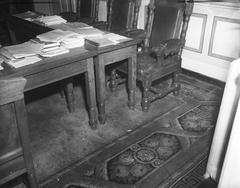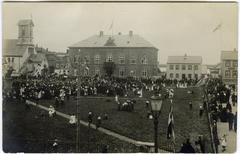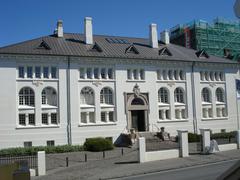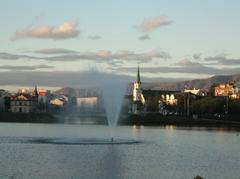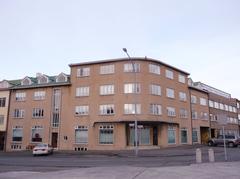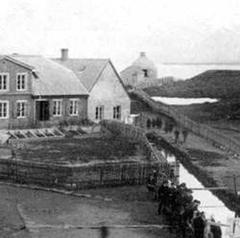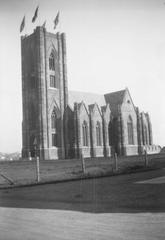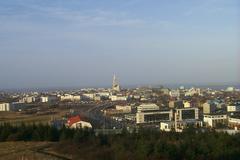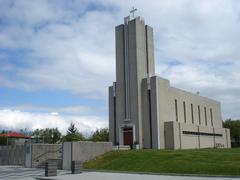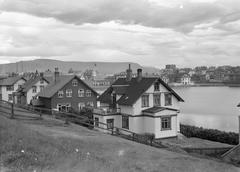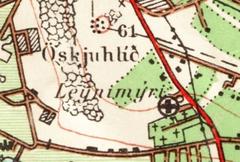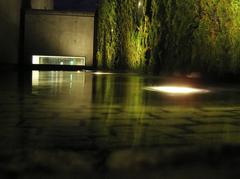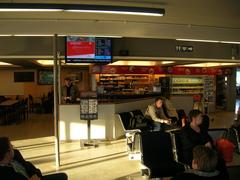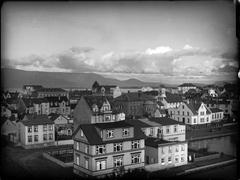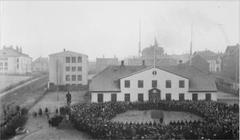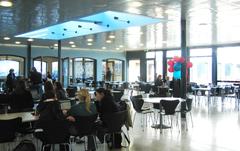Hallgrímskirkja: Visiting Hours, Tickets, and Comprehensive Guide to Reykjavík’s Iconic Historical Site
Date: 14/06/2025
Introduction
Hallgrímskirkja, rising majestically atop Skólavörðuholt hill, is not only Reykjavík’s tallest and most iconic building, but also a profound symbol of Icelandic culture, heritage, and artistic ambition. Designed by State Architect Guðjón Samúelsson and named after the revered 17th-century poet-clergyman Hallgrímur Pétursson, the church’s architecture draws inspiration from Iceland’s dramatic volcanic basalt columns, notably those at Svartifoss waterfall. Today, Hallgrímskirkja serves as a vibrant parish church, a celebrated concert venue, and a magnet for visitors seeking panoramic views of Reykjavík and a deeper understanding of Iceland’s identity.
This comprehensive guide details everything you need to know for a memorable visit—from opening hours and ticket prices to the church’s architectural significance, cultural role, and nearby attractions. For up-to-date information, visit the official Hallgrímskirkja website or explore resources from Icelandic travel and cultural platforms (EV Travel, All Things Iceland, Adventures.is).
Table of Contents
- Historical Background
- Architectural Vision and Expressionist Style
- Cultural and Religious Significance
- Visitor Information: Hours, Tickets, and Accessibility
- The Tower Experience: Panoramic Views
- Interior Highlights and Musical Events
- Travel Tips and Nearby Attractions
- FAQs
- Conclusion and Resources
Historical Background
Origins and Naming
Hallgrímskirkja, meaning “Church of Hallgrímur,” commemorates Hallgrímur Pétursson (1614–1674), a towering figure in Icelandic literature and spirituality, best known for his “Passion Hymns.” The church’s dedication reflects Iceland’s respect for its religious and literary traditions.
Design and Construction
Conceived in 1937 and designed by Guðjón Samúelsson, Hallgrímskirkja was envisioned as both a parish church and a national monument. Its design, inspired by Iceland’s basalt landscapes, was groundbreaking for its time. Construction began in 1945 and, after overcoming decades of technical and financial challenges, was completed in 1986. The process reflected the nation’s perseverance and the evolving aspirations of Reykjavík’s growing population (EV Travel, All Things Iceland).
Symbolism and National Identity
Hallgrímskirkja’s imposing silhouette has become a symbol of Icelandic resilience and creativity. Its prominent location ensures visibility from almost everywhere in Reykjavík, making it a defining feature of the cityscape and a beacon for locals and visitors alike (The Tourist Checklist).
Architectural Vision and Expressionist Style
Hallgrímskirkja is a masterpiece of Expressionist architecture. Its stepped concrete façade is directly inspired by Iceland’s volcanic basalt columns, creating a dramatic visual dialogue between nature and built form. The upward sweep of the 74.5-meter spire (244 feet) is both a literal and symbolic ascent, representing spiritual striving and national ambition.
The innovative use of reinforced concrete allowed for the church’s distinctive exterior “prongs,” echoing the natural formations found at sites like Reynisfjara and Svartifoss. The church’s scale and design were initially controversial but are now celebrated as a unique expression of Icelandic modernism (Strange Buildings, EV Travel).
Cultural and Religious Significance
Spiritual and Community Role
As an active parish church within the Evangelical Lutheran Church of Iceland, Hallgrímskirkja regularly hosts services, baptisms, weddings, funerals, and religious festivals. Its minimalist, light-filled interior fosters reflection and spiritual connection, mirroring the stark beauty of Iceland’s landscapes (adventures.is).
Center for Arts and Music
Hallgrímskirkja is renowned for its acoustics and is home to Iceland’s largest pipe organ, a 5,275-pipe instrument built by Johannes Klais of Bonn. The church is a hub for classical music, hosting regular organ concerts and the annual International Organ Summer Festival, drawing music lovers from around the world (adventures.is).
Historic Monuments
In front of the church stands the statue of Leifur Eiríksson (Leif Erikson), a gift from the United States to commemorate the Alþingi’s millennium, symbolizing Iceland’s Viking heritage and international connections (iceland.nordicvisitor.com).
Visitor Information: Hours, Tickets, and Accessibility
Opening Hours
- April–September: 9:00 AM – 9:00 PM
- October–March: 9:00 AM – 5:00 PM
Hours may vary during religious services or holidays. Always check the official Hallgrímskirkja website for updates.
Admission and Tickets
- Entry to Church: Free
- Tower Access: ISK 1,000 (approx. $7–8 USD) for adults; ISK 100 for children; discounts for seniors, students, and people with disabilities.
- Tickets can be purchased on-site at the reception desk; no advance booking is required (Your Friend in Reykjavik).
Accessibility
- The church and tower are wheelchair accessible, with ramps and elevators.
- Restrooms and a gift shop are available.
- Audio guides and brochures are offered in several languages.
The Tower Experience: Panoramic Views
A highlight of any visit, the observation tower is reached by elevator (with a short staircase at the top). From here, you can enjoy 360-degree views of Reykjavík’s colorful rooftops, Faxa Bay, Mount Esja, and, on clear days, the Snæfellsjökull glacier (Thoroughly Travel). For an unforgettable experience, visit about an hour before dusk to catch the golden hour and the city lights as night falls—occasionally, the Northern Lights may even be visible.
Tower access is restricted during Sunday mass and certain events, so plan your visit accordingly.
Interior Highlights and Musical Events
Hallgrímskirkja’s interior is characterized by a striking minimalist aesthetic: soaring white columns, vaulted ceilings, and tall windows that allow natural light to flood the nave. The grand pipe organ, with 5,275 pipes and 72 stops, is a centerpiece for the church’s acclaimed musical events (Nomad Epic). Attending an organ concert is highly recommended for those seeking a unique cultural experience.
Travel Tips and Nearby Attractions
Practical Tips
- No dress code is enforced, but modest attire is appreciated during services.
- Credit/debit cards are widely accepted; cash is not necessary (Full Suitcase).
- Weather can be unpredictable—bring layers and a windproof jacket.
- Responsible tourism is encouraged; respect the church’s function as a place of worship (Lonely Planet).
Best Times to Visit
- Summer: Long daylight hours, vibrant city life, and the chance to experience the midnight sun.
- Winter: Magical cityscape with snow, festive lights, and occasional Northern Lights.
Photography Tips
- For the best exterior photos, shoot from the base of Skólavörðustígur to capture the full façade.
- The observation deck is ideal for sweeping cityscapes; bring a wide-angle lens and visit during golden hour for optimal lighting (Nomad Epic).
Nearby Attractions
- Einar Jónsson Museum and Sculpture Garden: Just steps away.
- Laugavegur Street: Reykjavík’s main shopping and dining corridor.
- Sun Voyager (Sólfar) Sculpture and the National Museum of Iceland are within easy walking distance.
- Numerous cafés, boutiques, and galleries line the surrounding streets (Your Friend in Reykjavik).
FAQs
Q: What are Hallgrímskirkja’s opening hours?
A: April–September: 9:00 AM–9:00 PM; October–March: 9:00 AM–5:00 PM. Hours may change for services or events.
Q: Is there an admission fee?
A: Entry to the church is free. Tower access costs ISK 1,000 for adults and ISK 100 for children.
Q: Is Hallgrímskirkja wheelchair accessible?
A: Yes, including the main entrance and elevator to the tower. The final steps to the observation deck may require some mobility.
Q: Can I attend church services?
A: Yes, services are open to visitors and typically conducted in Icelandic.
Q: Are guided tours available?
A: Guided tours are offered seasonally and can be booked at the church or through local tour companies.
Q: When is the best time to visit for photography?
A: About an hour before dusk, to enjoy golden hour and the city lights.
Q: Can I buy tickets in advance?
A: Tickets are purchased on-site; advance booking is not required.
Conclusion and Resources
Hallgrímskirkja is much more than a Reykjavík landmark; it is a living testament to Iceland’s history, creativity, and community spirit. From its volcanic-inspired architecture and grand pipe organ to its panoramic observation tower, the church offers visitors a multifaceted experience—whether for worship, music, or sightseeing.
For the latest details on visiting hours, ticket prices, and event schedules, consult the official Hallgrímskirkja website. Enhance your visit by downloading the Audiala app for self-guided tours, maps, and real-time updates. Explore more of Reykjavík’s culture through related guides and articles from trusted travel resources.
Related Articles & Official Sources
- Hallgrímskirkja Official Website
- EV Travel: Hallgrímskirkja Guide
- All Things Iceland
- Adventures.is: Visiting Hallgrímskirkja
- Nordic Visitor: Hallgrímskirkja
- Your Friend in Reykjavik: Visiting Guide
- Nomad Epic: Things to Do in Reykjavík
- Thoroughly Travel: Reykjavík Attractions
- Strange Buildings: Hallgrímskirkja Architecture
- The Tourist Checklist
- Perlan: Hallgrímskirkja Article
- Full Suitcase: Iceland Travel Tips
- Lonely Planet: Iceland Travel Advice
